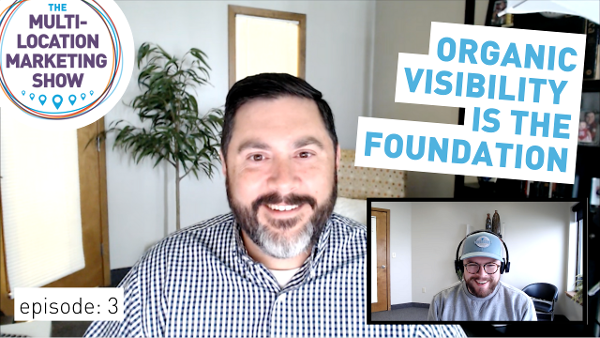

 {{cta(’04ac3532-a8c4-4c32-bfc5-47720bb69bab’,’justifycenter’)}}
{{cta(’04ac3532-a8c4-4c32-bfc5-47720bb69bab’,’justifycenter’)}}
SHOW NOTES
In this episode, Matt Nickols (CEO of MarketSnare) and Elliot Olson (Sales & Marketing Manager of MarketSnare) explore various topics related to multi-location marketing, including:
- In marketing, what is organic visibility?
- Organic search visibility is earned. You can’t pay to be there.
- How can a company get ranked high on results of search engines such as Google and Bing?
- Earned listings (which is another term for organic listings).
- The art of getting ranked higher is called Search Engine Optimization (SEO).
- Why local SEO is still relevant for national brands.
- At the local level, consumers are often searching for a category, rather than a brand. At the national level, consumers are more often searching for a brand.
- To local consumers, it often doesn’t matter if a national brand has a fantastic website. Local consumers are often more motivated to connect with local companies.
- How should a marketing team split their time and effort between organic visibility and paid advertising?
Learn more about how MarketSnare helps businesses succeed at digital marketing: https://www.marketsnare.com.
Be sure to subscribe to “The Multi-Location Marketing Show.” In our podcast, co-hosts Matt and Eilliot will share stories that empower marketers to take control of local websites, listings, reviews, social media, lead nurturing, and digital ads that deliver unrivaled results in each local market.
Connect and follow!
Matt Nickols: https://www.linkedin.com/in/mattnickols.
Elliot Olson: https://www.linkedin.com/in/elliotmolson.
MarketSnare LinkedIn: https://www.linkedin.com/company/marketsnare/about.
MarketSnare Twitter: https://twitter.com/marketsnare.
MarketSnare Facebook: https://www.facebook.com/MarketSnare.
MarketSnare’s local marketing automation platform empowers marketers to efficiently scale local marketing programs across many locations through unique centralized tools & services designed for multi-location businesses. Take control of local websites, listings, reviews, social media, lead nurturing, & digital ads to create marketing programs that deliver unrivaled results in each local market: https://www.marketsnare.com/podcast.
This episode was produced by Story On Media & Marketing: https://www.successwithstories.com.

